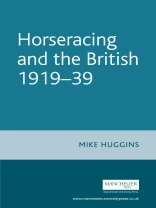This electronic version has been made available under a Creative Commons (BY-NC-ND) open access license. This book provides a detailed consideration of the history of racing in British culture and society, and explores the cultural world of racing during the interwar years. The book shows how racing gave pleasure even to the supposedly respectable middle classes and gave some working-class groups hope and consolation during economically difficult times. Regular attendance and increased spending on betting were found across class and generation, and women too were keen participants. Enjoyed by the royal family and controlled by the Jockey Club and National Hunt Committee, racing’s visible emphasis on rank and status helped defend hierarchy and gentlemanly amateurism, and provided support for more conservative British attitudes. The mass media provided a cumulative cultural validation of racing, helping define national and regional identity, and encouraging the affluent consumption of sporting experience and a frank enjoyment of betting. The broader cultural approach of the first half of the book is followed by an exploration if the internal culture of racing itself.
İçerik tablosu
Introduction 1. The racing business between the wars 2. Horseracing, the media and British leisure culture, 1918-39 3. Off-course betting, bookmaking and the British 4. Declining opposition to betting on racing 5. Racing culture: the racecourse and racecourse life 6. Jockeys, trainers and the micro-world of the stable 7. Breeders and owners Conclusion
Yazar hakkında
Jeffrey Richards is Emeritus Professor of Cultural History at Lancaster University












